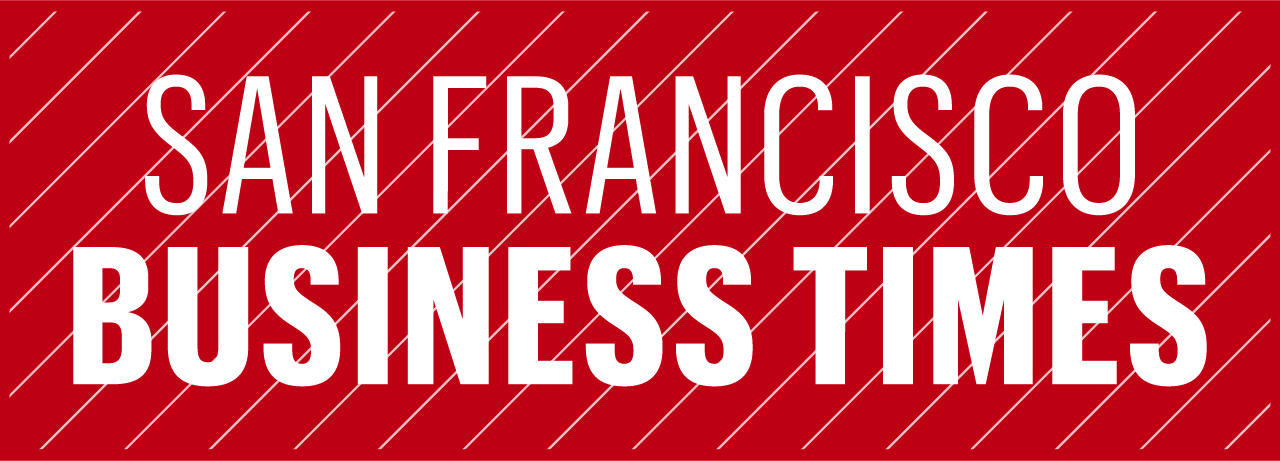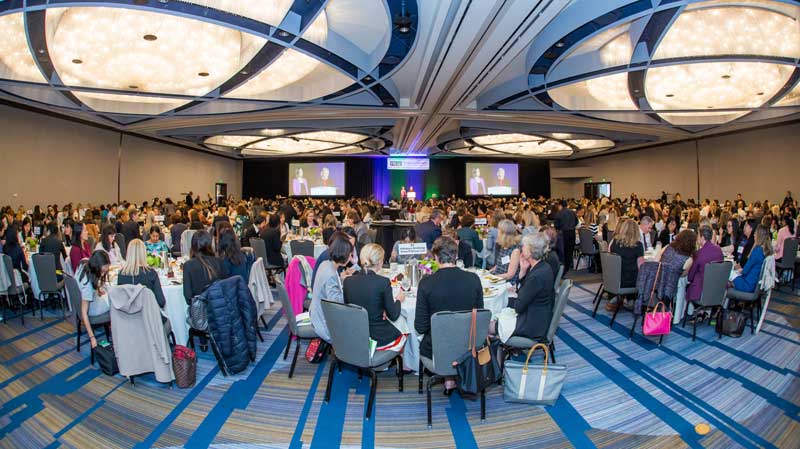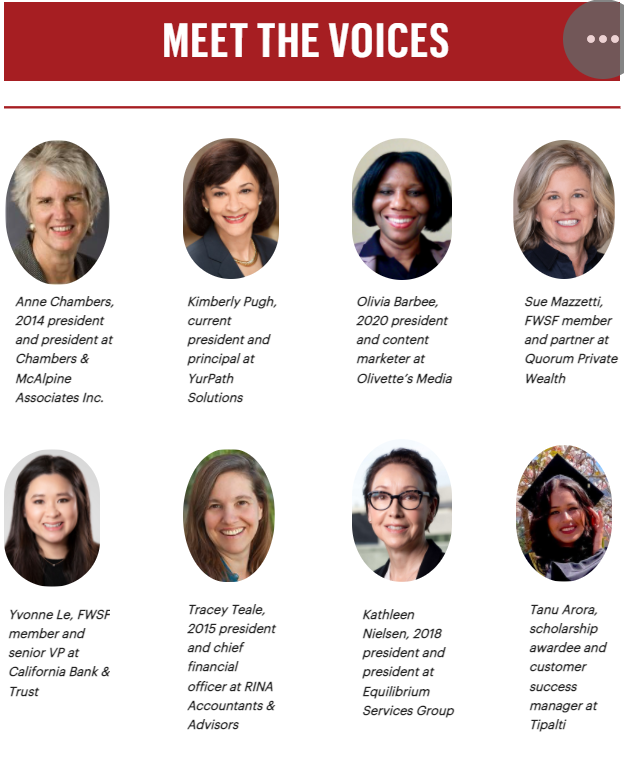
From the San Francisco Business Times

The Financial Women of San Francisco held its 2019 24th Annual Financial Woman of the Year awards at the Hyatt Regency in San Francisco. The organization hosts dozens of in-person – and now virtual – events featuring major financial figures like Henry Paulson and Janet Yellen.
In 1956, 17 women gathered to create The Financial Women of San Francisco in what was the first organization for executive women in finance in the entire country. Over the past 65 years the forum has changed countless lives by providing a place where women working in financial services can meet, share ideas and experiences and propel their careers.
The volunteer-run organization has evolved new ways to professionally advance its members through mentorship, events, awards and scholarships as dress codes, social mores and access to education and career opportunities expanded. Here is a personal history of FWSF and what it has meant from members, leaders and beneficiaries.
Women working in finance during the 1950s faced discrimination across the industry. There were clear barriers to entry and for any woman who did manage to get a job, the workplace was generally openly sexist. FWSF was started to provide a safe space for support and open conversation about the challenges of being a working woman in an environment that often sets you up for failure.
But the organization has persisted through the decades via a combination of institutional knowledge and flexibility to provide new types of resources and support.

Anne Chambers (2014 president): I remember when even job postings in the newspaper were segregated by men and women. Women only had certain kinds of jobs they were responsible for in the ’60s. In that kind of “Mad Men”-era, we were the original support group for these women. That’s what I’ve always heard in terms of the early days, how members really formed these tremendous bonds, because they had to get through by supporting themselves when guys were wanting to go off and treat people to burlesque shows and things like that.
Kimberly Pugh (current president): We are about advancing the success of women in finance. To think about how we started and how many women were in finance back in 1956. We’ve endured for over 60 years. We have members all the way from Gen Z to the Greatest Generation. Our oldest members are in their 80s.
Olivia Barbee (2020 president): Financial Women of San Francisco provides access to women who have walked pretty much whatever path you want to take. If you want to talk to various people about what would it look like if I joined a public accounting firm, if I started my own business? What do I need to do if I want to join a board one day, if I want to become a C level executive? There are women who are members of the organization who can answer a question on just about anything.
Pugh: At one event this woman walked up to me. She’s very elderly and kind of small and bent over. She introduced herself and gave me all this direction. I later found out that she had been involved in the 50s. She was just so warm and so welcoming, and had such great energy, even though you could tell she was frail, and she just really wanted to help me.
Kathryn Wheadon was FWSF president in 2019. She worked across the financial sector before starting her own consultancy and can recall numerous examples of when gender bias was present during that time. Her predecessor as president, Kathleen Nielsen, can recall instances of being the only female executive in male dominated boardrooms.
Wheadon: I sort of pivoted midway through my career from banking, into financial services, asset management and when I worked at the hedge funds, I very much felt gender bias. For me personally, the issue has always been more about gender bias as opposed to sexual harassment. That’s not everybody’s story. One of the very simplest things we do is that we provide a safe space for women to network and talk to each other and connect and face that bias when we’re in groups together.
Nielsen: I think all of us that have been through some stages of our careers have had to find other ways to navigate when we were the only ones in the room or at the table. And the ways that we found to navigate those situations and those events will vary for each of us.
FWSF operates programs through two local chapters; San Francisco and East Bay. It hosts regular events with speakers, including Janet Yellen and Condoleezza Rice, and educational programs on developments in payments systems, fintech, blockchain, tax regulation and anything else under the finance umbrella. At tumultuous moments in the financial markets like the 2001 dot-com crash or the Great Recession, these resources and forums provided invaluable insight and support.
Barbee: During the dot-com crash, it just felt like there was a series of earthquakes going off every week. I just remember going to a committee meeting, where after the business was done, a group of us sat around and discussed how this was affecting us. It was important just having that sisterhood and having people I could talk to with my guard down.
During the Covid-19 pandemic FWSF switched its regular in-personal events to become digital-only. Initial concerns were soon overcome as the organization acclimatized. Demand for FWSF’s services across the last 18 months remains as high as ever. Longtime member and Quorum Private Wealth Partner Sue Mazzetti helped orchestrate the pivot to remote events.
Mazzetti: I’m very proud of the organization that we were able to provide that to members. It just made people feel that human connection that we all were missing. And then we continued and built momentum and larger events.
Pugh: We kind of just got working and pulled together. It looked very daunting, like how long are we going to do these different things? We were holding our breath, but it was wonderful. And then more people found us as a result of that.
One of those newcomers was Yvonne Le, a senior vice president at California Bank & Trust, who found herself in moments of professional and personal introspection during the pandemic. She stumbled upon FWSF by googling “women, finance professionals in the Bay Area.” In less than four months as a member she has joined a committee and received powerful mentorship, all virtually.
Le: I started looking for organizations where I could make meaningful connections,be inspired by the membership and also collaborate and give back in some way. I was looking to make authentic connections and build networks that went deeper than just surface level conversations.
Tracey Teale (2015 president):The difference between networking at FWSF and what I found in other organizations is that it’s really developing friendships. It’s really connecting with people. I think that in a lot of other events, you cram a bunch of people in the room, maybe you swap business cards, but you never see them again.
Pugh: You have fabulous women in this group that you can always tap into, particularly when you’re having these huge years of transition, having that support, and a group of women that not only can provide great information, but they can also just be there for you.
It’s undebatable that the financial sector has undergone massive change since the 1950s. Whether the structural challenges confronting women in the financial sector have been so quick to change is more of an open question. FWSF is taking steps to dismantle invisible barriers internally and within the wider industry.
Barbee: I was the first person of color to be president of the organization. But looking at the younger women in the organization, I think we’re doing a very good job of being open and bringing people up and expanding opportunities. When I came in, the organization was in transition. We were, and still are to a certain extent, a little bit old school in a variety of different ways.
Nielsen: In the last couple of years on the diversity, equity, inclusion and belonging side of things, we’ve really tried to examine the ways that we do things and make sure that we, as an organization, are also being as inclusive of the community that we serve as possible.
Barbee: We decided that we wanted to be proactive and try to change the face of our industry. And a big way that we are doing that is through the scholarship program.
The FWSF scholarship provides $10,000-$15,000 toward tuition and individual mentorship. Over the past 30 years the organization has awarded over $2.6 million in scholarships to more than 300 women. Tanu Arora, a customer success manager at Tipalti, is one of the most recent awardees.
Tanu Arora: I feel like this is just a gift that keeps on giving.I was paired with a mentor, Janet Medina, and her experience was very similar to mine. It was absolutely amazing for me to have a vice president at Bank of the West as my mentor, because she had connections all over the Bay Area — any company, you name it, she had connections there.
For 65 years, FWSF has provided mentorship, education and opportunity for its members. The financial sector has evolved in myriad ways since its inception, but many of the challenges still persist. For many, the services FWSF offer remain just as vital today as back in the 1950s.
Nielsen: I think this community, the secret sauce that we have, we are all here to support each other. If I, in my role as mentor, can’t provide you with what you need, I’m going to find somebody who’s had a similar experience as you. And I’m going to connect you with them, and they’re going to have coffee with you, because they want you to succeed as much as I do.